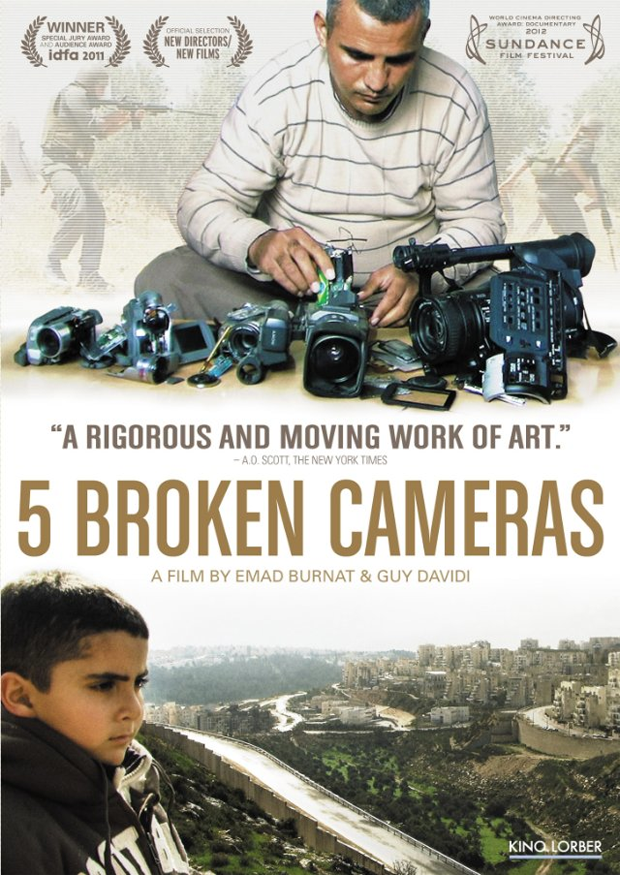 Because the United States is Israel’s staunchest ally, if you confine yourself to our mainstream news reportage, almost the only times you hear about Palestinians are when they’re lobbing missiles at Tel Aviv or blowing up a bus in Jerusalem.
Because the United States is Israel’s staunchest ally, if you confine yourself to our mainstream news reportage, almost the only times you hear about Palestinians are when they’re lobbing missiles at Tel Aviv or blowing up a bus in Jerusalem.
But you may also have heard about the settlements, which Israel continues to build in the West Bank. Even the U.S. government—never mind the rest of the world—condemns this practice, which is a clear violation of international law. But no one does anything about it, nor about the Apartheid-like conditions the Palestinians are forced to endure.
This is the bleak background against which the Academy Award-nominated documentary 5 Broken Cameras plays out, as Emad, a self-described Palestinian peasant who lives off the land, films the protests his kith and kin undertake in reaction to continual Israeli encroachments on his small village. What transpires is a five-year saga that makes plain how Israel is doing just about everything wrong if it truly wants peace with the Palestinians. It is a profoundly depressing film, but one every American should see so as to understand a reality on the ground in the Middle East that gets little play in this country.
Gibreel, Emad’s fourth son, is born in 2005, and Emad obtains a camera so as to document the boy’s life. Emad has seen how profoundly his first three children were shaped by political events. One was born in 1995, the Oslo Peace Accords, and his early years were filled with hope. Another was born on the first day of the 2000 Intifada in a hospital full of wounded and dying compatriots. What are the events that will shape Gibreel?
Because cameras are uncommon in Bil’in, Emad becomes the unofficial village cameraman, called upon to film events all sorts. Quite naturally Emad begins filming protests against the separation barrier that splits his family’s land in half, as well as the ever-increasing settlements. The footage Emad obtains is striking, as more often than not Israeli soldiers pay no mind to cameras, even as they toss teargas canisters and fire live rounds at peaceful, unarmed protesters—which they do quite often. Not every Israeli soldier is a brute, of course, but there’s no denying the systemic Israeli brutality on display in 5 Broken Cameras, such as the shocking footage of troops shooting a handcuffed Palestinian in the leg from point-blank range. Or when a solider take deliberate aim at Emad and his camera, and shoots to kill.
“I have to believe that capturing these images will have some meaning,” Emad says at one point, struggling with how to process the disheartening events that take place on an almost daily basis in Bil’in. “[…] Clinging to nonviolent ideals isn’t easy when death is all around.”
Emad also struggles with how life in Bil’in is shaping Gibreel. One of the film’s saddest moments comes after the Israeli army basically murders one of the village’s most positive and peaceful figures. “Daddy,” asks the 4-year-old Gibreel, “why don’t you kill the soldiers with a knife? […] Why did they shoot [him]? What did he do to them?”
“The old wounds don’t have time to heal,” Emad says as the film opens. “New wounds cover them up.” It’s a simple statement about the cycle of violence that is shaping generation after generation of Palestinians. 5 Broken Cameras offers no solution, nor much in the way of hope. Its potential contribution to change lies in how bluntly it documents what an abject failure the status quo is. When enough people see what’s happening, perhaps they will put enough pressure on their leaders—particularly in Israel (it’s worth noting that 5 Broken Cameras is an Israeli co-production) and the United States—to get Israel to change tack. Until then, children like Gibreel will grow up to hate Israel, and the cycle will not end.
5 Broken Cameras screens Saturday, April 6, at 11:30AM —yes, one showing only. For all things Art Theatre (2025 E. 4th Street, LB 90804), call 562.438.5435 or visit arttheatrelongbeach.com.

